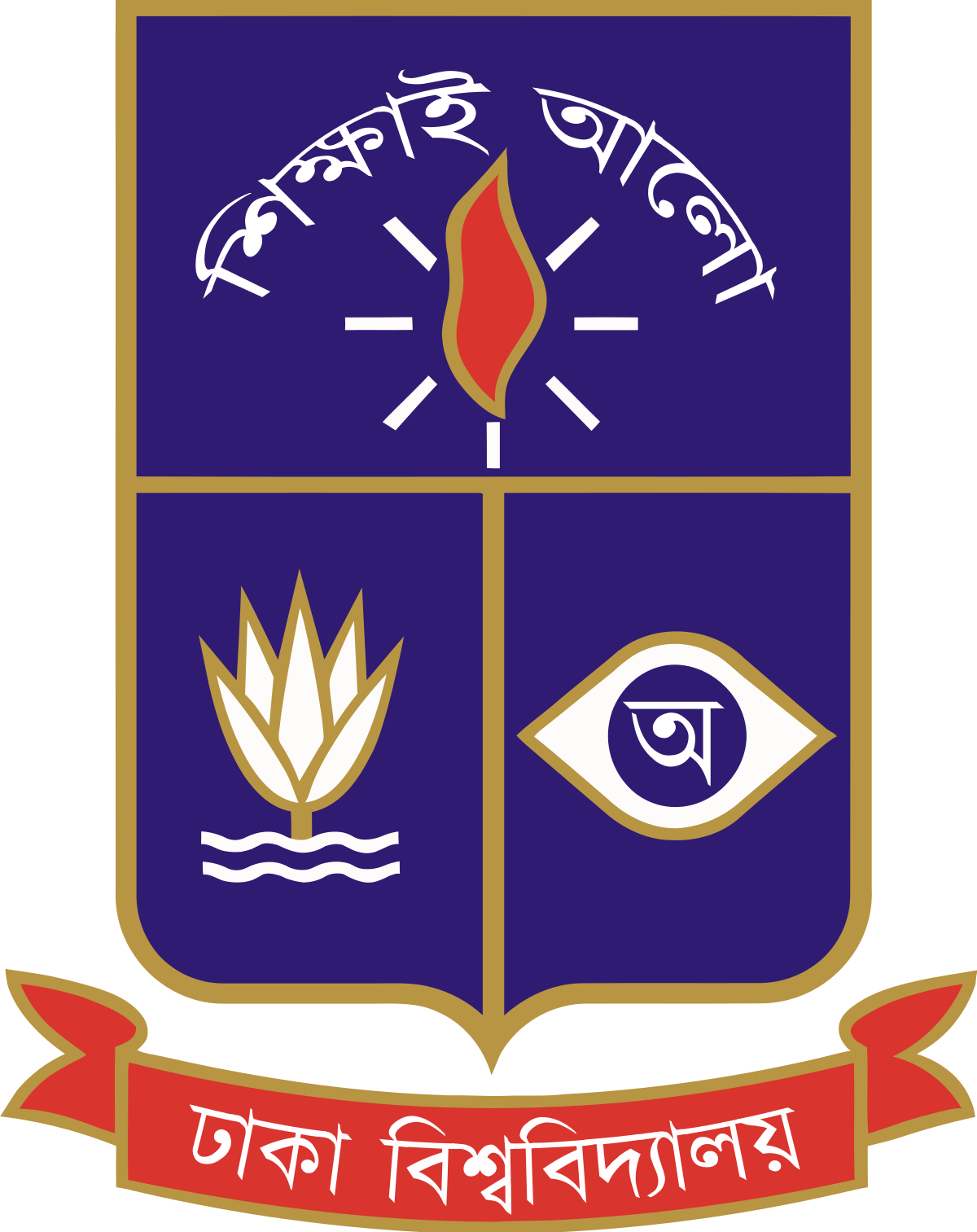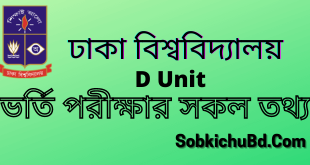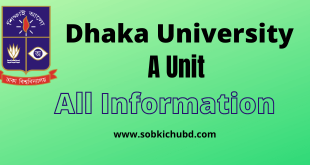Dhaka University is in the first position in public university Ranking. Students have to go through tough competition in order to get a chance here. Dhaka University has 5 different units with different subjects. Each of Unit has different requirements. Among these 5 units here we are going to deliberate Dhaka University B Unit Admission Test Notice 2020-21. Also, the Dhaka University Admission Test circular 2020-21 has been published by the official website ( https://admission.eis.du.ac.bd/ ) of Dhaka University.

Post Contents
Dhaka University Will Hold Divisional Examination.
Due to the COVID crisis, Dhaka University Admission Examination Committee has decided to hold a divisional exam, That means every examinee will sit for the exam in their own hometown or the district they live in,or the district they choose to give the exam. The total evaluation marks is said to be 100 and 20 marks will be for SSC & HSC result. This decision is valid for only the students of 2020-2021 academic session. The full information about the exams will be published on the official website, Click Here
Dhaka University Changed Marks Distribution for 2020-2021
| Total Marks | Admission Test Marks | Result Marks(SSC & HSC) |
|---|---|---|
| 100 | 80 | 20 |
*** The notice is valid only for 2020-2021 session. Any further changes will be notified in the official website***
- Viva exam won’t be held this year.
- Decision is yet to be made whether the exam will be only MCQ or part MCQ and part Written.
DU B Unit Admission Test 2020-21
Dhaka University Admission Test for the academic session 2020-2021 of Graduation (Honours) 1st year will be held on next 13th January(Wednesday) 2021. DU ‘KHA’ Unit Admission Test will be held on 21st January(Thursday) 2021. The awakened candidates will have to apply in Dhaka University Admission Test Notice 2020-21 online. The time of Online application for DU Admission Test 2020-2021 calculating on the next 31st July (Tuesday) 2020. Students from the group of Humanities can only apply for the B Unit. This year students can’t take part in Dhaka University Admission Test 2020-21 for 2nd time.
Time Duration for Online Application
Interested candidates must apply in Dhaka University Admission Test Notice 2020-21 online. They can apply to the official website ( https://admission.eis.du.ac.bd/) of Dhaka University. Here is the time duration for Online Application:-
| Online Application Date Start: | January 2021 |
| Online Application Date Finnish: | February 2021 |
DU B Unit Admission Requirements
There are some specific requirements in order to apply for specific units. Here is the minimum requirement to apply for the B unit.
- Candidates must have a total GPA of 7.00 (with 4th subject) in SSC and HSC level exams.
- SSC must be passed in 2015 or 2016.
- HSC must be passed in 2020.
- Students from the Humanities group only can apply for the B unit.
- There are different number/grade requirements for each department/institute. Students must follow that as well.
- Students who have participated in the IGCSE/ O Level examination in 2015 must have been passed in a minimum of 5 subjects and IAL/GCE/A Level examination in 2020 must have been passed in a minimum of 2 subjects.
- Foreign certificates or diplomas must be approved by the faculty first also then it has to fulfil the requirements of each unit.



The following marks distribution is for previous sessions-
DU Marks Distribution
The deans’ committee of Dhaka University has decided in its July 3 meeting that there will be a new marks distribution pattern for admission tests. For the upcoming 2020-21 academic session there will be written part as well as the multiple-choice questions (MCQ). Students will get space to answer in the question paper for the written part.
Marks Distribution And Time Duration Table:-
| Total evolution marks: | 200 |
| SSC & HSC result: | 80 marks |
| Admission Exam: | 120 marks |
| Time: | 1 hour 30 mins |
Click the link below to download DU B Unit Admission Notice PDF of the previous session:-
Download DU B Unit Admission Notice PDF





Candidates must execute all the Admission related activities from the official website of Dhaka University:-
Dhaka University Official Website
Dhaka University B Unit Faculty List
The students who are in Humanities group only they can apply for this Unit. Here Is the list of faculties for B Unit:-
- Arts Faculty
- Social Science Faculty
- Law Faculty
- Earth and Environmental Faculty
- Biology Faculty
- Social Welfare and Research Institute
- Health Economics Institute
- Education and Research Institute
- Institute of Disaster Management and Vulnerable Studies
- Modern Language Institute:-
a) BA Honours in English for Speakers of Other Languages (ESOL)
b) BA Honours in French Language and Culture (FLC)
c) BA Honours in Chinese Language and Culture (CLC)
d) BA Honours in Japanese Language and Culture (JLC)
DU B Unit Faculty, Department And Seat
Dhaka University B Unit is primarily for the students of Humanities. B Unit consists of several faculties. These several faculties consist of several departments. One can easily get in here being passionate and by doing hard work. Here we are going to show the details of DU B Unit Faculties.
Arts Faculty
| Department/Institute | Seats |
|---|---|
| Bangla | 102 |
| English | 128 |
| Arabic Studies | 110 |
| Persian Language | 74 |
| Urdu | 71 |
| Sanskrit | 86 |
| Pali & Buddhist Studies | 66 |
| History | 101 |
| Philosophy | 145 |
| Islamic Studies | 148 |
| Islamic History | 121 |
| Library Management | 29 |
| Theater and Performance Studies | |
| Linguistics | 57 |
| Music | 40 |
| World Religion | 46 |
| Dance | 07 |
Social Science Faculty
| Department/Institute | Seats |
|---|---|
| Economics | 50 |
| Political Science | 102 |
| International Relations | 52 |
| Sociology | 149 |
| Journalism | 34 |
| Public Administration | 51 |
| Anthropology | 32 |
| Population Science | 14 |
| Disaster Management | 16 |
| Women and Gender Studies | 30 |
| Development Studies | 14 |
| Television& Film Studies | 13 |
| Criminology | 21 |
| Communication Disorder | 21 |
| Printing & Publication | 10 |
| Japanese Language | 20 |
Law Faculty
| Department/Institute | Seats |
|---|---|
| Law | 66 |
Earth and Environmental Faculty
| Department/Institute | Seats |
|---|---|
| Geography and Environment | 40 |
Biology Faculty
| Department/Institute | Seats |
|---|---|
| Psychology | 55 |
Social Welfare and Research Institute
| Department/Institute | Seats |
|---|---|
| Social Welfare | 92 |
Health Economics Institute
| Department/Institute | Seats |
|---|---|
| Health Economics | 31 |
Education and Research Institute
| Department/Institute | Seats |
|---|---|
| Education & Research | 47 |
Institute of Disaster Management and Vulnerable Studies
| Department/Institute | Seats |
|---|---|
| Disaster Management and Vulnerability | 16 |
Modern Language
| Department/Institute | Seats |
|---|---|
| ESOL | 25 |
B Unit Marks Distribution And Prospectus
| Total evolution marks: | 200 |
| SSC & HSC result: | 80 marks |
| Admission Exam: | 120 marks |
| Time: | 1 hour 30 mins |
GPA of SSC will be multiplied by 6 and GPA of HSC will be multiplied by 10. Then the sum of this will be added with the point of the Admission Test. To pass one must obtain 48 out of 120 in Admission Test.
- MCQ Part : For MCQ part students will get 50 minuets to get total 75 number. Mark reduction for each wrong answer is 0.25 .
| Subjects | Number | Questions |
|---|---|---|
| Bangla/Elective English* | 16×1.25 = 20 | 16 |
| General English | 16×1.25 = 20 | 16 |
| General Knowledge | 28×1.25 = 35 | 28 |
| Total Number: 70 | Total Questions: 60 |
Minimum requirement for marks to get pass:-
| Subjects | Pass Marks |
|---|---|
| Bangla/Elective English* | 06 |
| General English | 06 |
| General Knowledge | 12 |
* Students who have passed GCE/A level only they have to answer the Elective English Part.
- Written Part: For written part students will get 40 minutes to get a total of 45 number.
| Subjects | Numbers |
|---|---|
| Bangla/Elective English* | 25 |
| General English | 20 |
| Total Number: 45 |
The minimum requirement for marks to pass in written part: 12
* Students who have passed GCE/A level only they have to answer the Elective English Part.
**Students are not allowed to use any kind of device like Mobile phone, Calculator, Electric watch or any kind of Electric devices, Papers( without admit card) in the exam hall**
Dhaka University B Unit Subject Description
- Arts Faculty : Established in 1921, the Faculty of Arts, one of the largest faculties of the university, consists of sixteen Departments: Department of Bengali, Department of English, Department of History, Department of Islamic History and Culture, Department of Philosophy, Department of Information Science and Library Management, Department of Arabic, Department of Islamic Studies, Department of Sanskrit, Department of Pali and Buddhist Studies, Department of Persian Language and Literature, Department of Urdu, Department of Language Science, Department of Theatre, Music, and Department of World Religions. The academic activities of these departments are conducted by the Faculty of Arts. Four research journals, two in Bengali and two in English are published every year from the Faculty. The faculty office is located on the first and second floors of the Arts Building.
- Social Science Faculty : The Faculty of Social Sciences is one of the oldest, largest, and most diverse academic units at the University of Dhaka. Since its foundation on 2 October 1970, the Faculty has expanded in size and importance to include a wide range of academic disciplines that study human culture, society and politics, and that are theoretically based and empirically well-founded. The Faculty has set its goal to impart interdisciplinary knowledge, skills, and values to students in order to contribute to their academic and professional development. The Faculty of social sciences is organized into 16 academic Departments which are responsible for undergraduate and postgraduate teaching and research The Departments which constitute the Faculty are Department of Economics, Department of Political Science, Department of International Relations, Department of Sociology, Department of Mass Communication and Journalism, Department of Public Administration, Department of Anthropology, Department of Population Sciences, Department of Peace and Conflict Studies, Department of Women and, Gender Studies, Department of Development Studies, Department of Television, Film and Photography, Department of Criminology, Department of Communication Disorders Department of Printing and Publication Studies, and Department of Japanese Studies.
- Law Faculty : Welcome to the Faculty of Law, the University of Dhaka. Thank you for your interest in the Faculty. The prospectus provides a general overview of the Faculty and its Department. The Faculty of Law, University of Dhaka is home for those law students who desire and deserve to make a change in the intellectual and practical premises of the law. Traditionally, the best students among those who qualify for admission to the University of Dhaka under B-unit (Arts Faculty) and D-unit (combines Science, Humanities and Business Studies groups) opt to study law. So, it can be legitimately claimed that the Faculty accommodates a group of very bright students of the country. At present, we have 43 full-time academics, of whom 24 are PhD holders, having excellent academic records, expertise and experience in different aspects and areas of laws. The Faculty has 20 professors all of whom received their degrees from world-renowned law schools.
- Earth and Environmental Faculty: Humankind has always been curious about our environment, but there is a new urgency to our faculty’s mission to understand the planet Earth and Environment and to convey that understanding to our students. Only a few decades ago, Earth and Environmental Science was the study of natural phenomena, but now humans are altering the Earth’s climate, its landforms, and its biota. Floods, earthquakes, volcanic eruptions, tsunamis, hurricanes, and other natural hazards have always been with us, but they are more destructive on our increasingly crowded planet because of our own activities. It is an exciting time to study the Earth and Environmental Sciences, because of its importance to humanity as well as its intellectual stimulation. Evolving technologies let us see the Earth as never before, from satellite observations on the planetary scale to that of particulates a few millionths of a meter in length. All of this is generating new knowledge at an unprecedented rate. Our modes of working range from observational studies much like those of the naturalists and explorers of an earlier era to complex computer modelling and sophisticated laboratory techniques.
- Biology Faculty: The faculty of Biological Sciences was established in 1974. At its inception, the faculty consisted of the Departments of Soil Science (Presently Soil, Water and Environment), Botany, Zoology, Biochemistry (presently Biochemistry and Molecular Biology), Psychology and Pharmacy. Later on Four other new departments namely, Department of Microbiology (1979), Department of Clinical Psychology (1997), Department of Aquaculture and Fisheries (1997) (presently Department of Fisheries) and Department of Genetic Engineering and Biotechnology (2000) have become members of the faculty. In the meantime, Pharmacy has also become a separate Faculty. The Departments of the faculty offer a four year Bachelor of Science, B.S. (Honours); a one year Master of Science (M.S.) and also M.Phil and PhD.Programmes. Since its inception, the Departments belonging to this faculty have been conducting research on various fields of national interest, which have already earned recognition and fame both nationally and internationally. In their research endeavour, the Departments have established MOU with national and overseas universities and research institutions. There are two higher research centres at this Faculty, namely, Biotechnology Research Centre and the Centre for Advanced Research in Biological Sciences. Research grants are available in these Centres for the teachers of the Faculty to support small-scale research.
- Social Welfare and Research Institute: Social Welfare: Recent Look/Understanding The social welfare concept took a new direction in the nineteenth century, through certain processes and not by an accident. This was an era of social and technological change with intellectual adventure. The traditional concept of social work, a charity with immediate assistance did not stand in the test of the changing time. It melted away before the challenge of emerging psycho-social and economic problems hatched by speedy growth of population, rapid industrialization and urbanization gave way to the modern concept, where belief in the dignity and potentiality of human, respect for his/her personality came in the fore. And ultimately the “Lady Bountiful” was replaced by the professional social worker to give solace and relief to the suffering humanity. With the ever-increasing socio-economic problems, coupled with the wide acceptance of the concept of the welfare state, the scope of social welfare as a profession has widened and got momentum. Moreover, as the history attests, substantial progress made by this profession in the shortest possible time, in the developed as well as the developing countries, has given it a firm footing and an assurance of smooth go-ahead.
- Health Economics Institute: Since the early 1990s, the Health Sector of Bangladesh has been undertaking huge interventions so as to rapidly improve the health status of the population. Accordingly, in the fourth and fifth health sector programmes, the targeted coverage of the sector has been substantially expanded. The magnitude of health services to be devoted per person has been increased, and the measures have been proposed to drastically enhance the quality of services. Implementation of the plan requires a huge amount of resources, but the relative availability of resources has been declining. Given the growing scarcity of resources for the Sector, the only way to increase the coverage and improve the quality of services is to intensively utilize the existing facilities and allocate resources to the sectoral activities more efficiently. Increased allocative efficiency of resources requires, on the other hand, imparting regular training in health economics to the managers and professionals of the sector and others carrying out research on health economic issues. The Government has increasingly felt the need for training of the personnel of the sector and conducting research in health economics and started sending officials abroad to study health economics. It later became evident that the cost of overseas training of each person is so high that the government will not be able to train the required number of personnel using the small amount of fund received from the donors.
- Education and Research Institute: The Institute of Education and Research (IER), University of Dhaka, was established through the joint efforts of the University of Dhaka, the then Government of Pakistan and the U.S. AID ( then ICA) Mission. The U.S. AID Mission in the then Pakistan entered into a contract with the Colorado State College, (later became the University of Northern Colorado), Greeley, Colorado, U.S.A., for professional services to establish, organize and direct the initial stages of IER, including advanced overseas training of teachers. The contract came into effect on November 1, 1959. The classes of the Institute began on July 1, 1960, with 33 students of one year M.Ed. degree program. Over the year it has expanded and diversified its programmes. The number of students increased from 33 in 1960 to 700 (the academic year 2002- 2003). The Institute of Education and Research, University of Dhaka is an apex institute in the field of professional education in Bangladesh. It is the only Institute of its kind under the public universities of Bangladesh which offers teaching programmes leading to higher professional degrees, conducts advanced research studies and provides extension services in education. Its professional staff, most of them having overseas post-graduation and doctoral degrees and long experiences with specialization in various aspects of education render professional services to Government-sponsored committees and commissions on education to help develop the education sector of Bangladesh and provide consultancy services at both national and international levels.
- Institute of Disaster Management and Vulnerable Studies: Welcome to the Institute of Disaster Management and Vulnerability Studies Dhaka University (IDMVS). IDMVS was founded as an Institute from the Department of Sociology in 2012 by Dhaka University and the Government of Bangladesh as a direct response of the University to the increasing concern on Disaster Management. Climate Change deterioration leading to the disaster s in the country’s context and the need to develop human resources for the proper management of the environment and natural resources. Its mandate is to promote the development of the management of disaster and natural resources through training and research in many aspects of Bangladesh’s environment and natural resources. IDMVS operates within the vision of Dhaka University, which is to “To be a leading institution for academic excellence and innovations on disaster management in Asia”. The mission of IDMVS is “To build capacity through training and research for disaster management responsive to national and global needs”.
Dhaka University B Unit Admission Result
Admission result will be published by the Dean Office and Students can show the result from the Dhaka University official website. To get the result click the link below:-
Admission Result Of DU B Unit
So here is some information about Dhaka University B Unit Admission Test Notice 2020-21 for the students who are eager to get a chance in this unit and wanted to have an idea. Some Information may update in the course of time. Stay connected.




